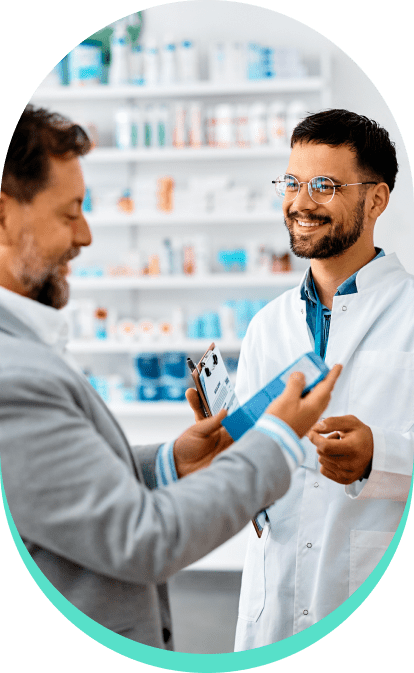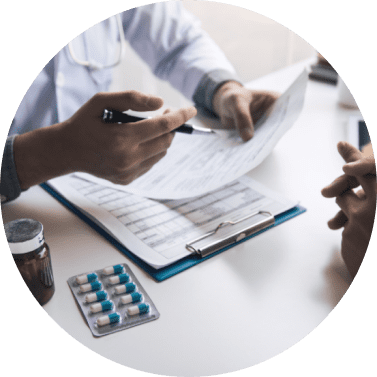
A compounded medication is a drug that is specifically mixed and prepared just for you, based on a prescription from your doctor.
This may be because the exact dosage is not commercially available, an added flavor is needed to make it more palatable for children, or to adjust the medication from commercially available pill/capsule to liquid or topical because a patient can’t swallow.
Compounded medications have been a part of healthcare since the origins of pharmacy and are widely used today in all areas of the pharmaceutical industry from hospitals to nuclear medicine. Compounding is a science of preparing specialized medications for patients. They are initiated by a prescription request in which carefully measured ingredients are mixed together in the exact strength and dosage custom to the patient. The doctor that is prescribing works closely with the pharmacist to get the exact medication combination that will work for your specific needs. Compounding enables prescribers and pharmacists to meet the special needs of patients on a one to one basis.

Hormone Replacement Therapy (HRT) is the treatment of hormonal imbalances to alleviate symptoms associated with age-related hormonal changes such as menopause. Hormones can be delivered orally, topically, or vaginally, and are compounded to a patient-specific dose. Types of hormonal imbalances treated include, but are not limited to, estrogen, and progesterone imbalance, and testosterone replacement.
Patients fill out an evaluation and history for the pharmacist to review. The patient and pharmacist will discuss goals for therapy and come up with a plan together to reach those goals. Once labs return, the pharmacist will evaluate the results and send a recommendation to the physician so the patient can start on HRT, if appropriate. Expect to be in contact with the pharmacy team at least monthly until balanced. Labs and pharmacists visits will be scheduled every six months for follow up once hormones and symptoms are balanced.
Saliva testing is a non-invasive collection method where patients collect their saliva in plastic tubes in order to measure hormones like cortisol, estrogens, progesterone, and androgens. This non-invasive saliva collection is ideal for patients because it allows them to collect their sample in the privacy of their home or office.
Steroid hormones in the bloodstream are 95-99% bound to carrier proteins, and in this form are unavailable to target tissues. Saliva testing measures the amount of hormone available to target tissues – the bioavailable amount. For this reason, saliva testing better relates to specific symptoms of excess or deficiency, and is a good option for monitoring hormone therapy

Low-dose naltrexone (LDN) has been demonstrated to reduce symptom severity in conditions such as fibromyalgia, Crohn’s disease, multiple sclerosis, and complex regional pain syndrome. LDN operates as a novel anti-inflammatory agent in the central nervous system, via action on microglial cells. These effects may be unique to low dosages of naltrexone and appear to be entirely independent from naltrexone’s better-known activity on opioid receptors. As a daily oral therapy, LDN is inexpensive and well-tole.rated


LDN is administered in many different forms and dosages. Low dose naltrexone is commonly started once daily, at 0.5 to 1.5 mg. This is to allow the clinician to evaluate how the patient will respond. Side effects, reported by patients, can often be prevented by the patient starting at a low dosage and increasing weekly until reaching 4.5 mg or dosage that best suits the patient.


When none of the available medication options are suitable for your pet’s condition, your veterinarian may discuss using a compounding pharmacy to create the best compounded medication for your pet’s individual needs. For example, maybe your cat needs a daily pill to treat hyperthyroidism but rejects tablets that are hidden in her food. Or perhaps a dog requires anti-seizure medication, but his required dose isn’t available in tablet form. Compounding pharmacies can customize a medication into specific doses and formulations that are easier to administer.

As a pet owner, you want your pets to receive the highest quality veterinary care. As any pet owner is well aware, animals can be extremely difficult to treat with medications. Dosages are usually tricky and exotic pets pose many unique med challenges. A compounding pharmacist is equipped to help all of your domestic animals.

Your veterinarian can work closely with the pharmacist to make sure they are cared for and given the accurate medication that is needed through compounded medications.
The most common forms of compounded drugs used in veterinary medicine include transdermal gels, capsules and flavored suspensions.
These are modified to make the medication more palatable for the pet. Popular flavor enhancers used for pets include beef, chicken, fish, peanut butter and banana.
These are used to combine several ingredients, or to create a new form of a discontinued medication. The capsule itself may be easier for certain pets to swallow, compared to other types of medications.


These can also come in flavored forms. Some flavored options, such as “Medi-Melts” are designed to dissolve on the tongue for pets that are too sick to swallow. Soft chews are easier to administer than pills because they are more like treats.
This is a topical treatment that is made by suspending the active ingredient of medication in a gel or cream. The medication is administered by rubbing a measured amount onto a hairless area of the pet’s body, such as the inner ear, where the active ingredient is then absorbed. This type of compounded medication is typically chosen for pets that refuse to take pills.